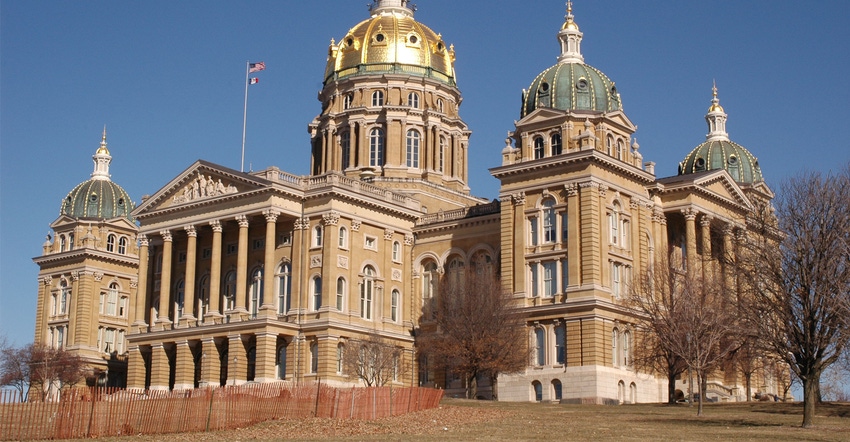May 15, 2017

Every year we update readers on the outcome of the Iowa Legislature’s activities and how they impact the state’s farmers and agriculture in general. On April 22, the Iowa Legislature adjourned its 2017 legislative session. Several bills relating to agriculture passed both the House and Senate, and have been signed by Gov. Terry Branstad or are waiting on his desk for a signature. May 22 is the deadline for bills to be signed into law.
In past columns, we mentioned the emphasis on water quality funding. The debate was lively on this during the 2017 session. However, there were several other bills introduced relating to water quality that didn’t make it through both the House and Senate, but proposed different funding mechanisms to address water quality. To be sure, the Legislature will discuss and debate this issue again next year.
Here is a list of ag-related bills that did pass both the House and Senate. This list is not exhaustive, but highlights some of the bills of particular interest to farmers and ag groups that work with farmers.
Appropriations bills
• Ag and Natural Resources. Iowa Agriculture Secretary Bill Northey in his 2017 Iowa legislative wrap-up commented there was progress regarding conservation and water quality efforts despite a difficult budget situation. The Ag and Natural Resources Appropriations bill (Senate File 510) passed the House and Senate in April, and has been sent to the governor’s desk. Among other things, the bill appropriates funds to Iowa Department of Agriculture and Land Stewardship ($21.16 million) and the Department of Natural Resources administration ($11.3 million). Overall, there was a $975,000 increase from last year in the amount appropriated for the Iowa Water Quality Initiative, totaling $10.58 million. The bill also eliminated funding for the Watershed Improvement Review Board and the Leopold Center for Sustainable Agriculture.
Additional appropriations include $189,196 for dairy regulation; $75,000 for local food and farm programs; $500,000 to IDALS from the Renewable Fuel Infrastructure Fund for motor fuel inspections; $130,000 for Farmers With Disabilities; $25,000 for FFA Foundation; $1 million for the Conservation Reserve Enhancement Program; $900,000 for the Conservation Reserve Program; $3.8 million for soil and water conservation; $8.33 million for cost share; $2.38 million for water quality; $3.4 million for groundwater protection fund; $1.69 million for groundwater monitoring; $1.32 million for animal feeding operations; $425,000 for air quality monitoring; and $100,000 for foreign animal disease preparedness and response fund.
• Rebuild Iowa Infrastructure Fund. House File 643 makes the fiscal year 2018 appropriations from the Rebuild Iowa Infrastructure Fund. New appropriations include $82.38 million from RIIF and $15.71 million from the State Bond Repayment fund. IDALS: $5.2 million for water quality; $1.88 million for agricultural drainage wells; and $3 million for renewable fuels.
• Education appropriations. HF 642 makes the FY 2018 General Fund appropriations for education to the regents institutions, including Iowa State University’s Ag Experiment Station, $29.89 million; co-op Extension, $18.27 million; and livestock disease, $172,844.
• Economic development appropriations. SF 513 appropriates $400,000 to the World Food Prize and the bill transfers administration of the Iowa Energy Center from ISU to the Economic Development Authority. The bill provides that the center is to expand workforce and career opportunities for workers in the energy sector.
• Beginning Farmer Tax Credit. Another issue facing beginning farmers and those who rent to them in 2018 is the fact that the Legislature did not extend some key provisions related to the beginning farmer tax credit. The Ag Assets Tax Credit for 2018 will return to 5% (from 7% in 2017) of the value of a cash-rent lease and 15% (from 17%) of the value of a crop-share lease, and the credits will be capped at $6 million. The newly created (in 2016) custom farming credit is also set to expire.
• The Responsible Farm Protection Bill. SF 447 was signed by the governor March 29. The bill establishes a new section in Iowa Code to provide nuisance protection to responsible livestock farmers.
• Noxious amaranth. HF 410 makes Palmer amaranth a primary noxious weed and a prohibited invasive plant. If a person fails to comply with an order from the county weed commissioner to destroy Palmer amaranth, they will be subject to daily fines for up to 10 days, and then the county weed commissioner can enter to destroy the weed and assess the costs against the landowner.
• County fair protections. SF 362 bars claims against county or district fairs for damages arising out of the transmission of pathogens from animals housed on the fairgrounds.
What’s on the horizon for next year?
As is the case every year, several bills of interest to farmers were introduced that didn’t make it to the governor’s desk, including bills proposing different solutions for funding programs and practices to address water quality issues. There were also several bills introduced proposing state coupling with federal Section 179 tax provisions. Due to the budget situation, the Legislature did not move on those bills, and there will be no Section 179 coupling this year.
When this article went to press, some of the bills that passed both houses were not yet signed by the governor. For further information on any of the bills mentioned, visit legis.iowa.gov. A special thanks to my partners, Eldon McAfee and Julia Vyskocil of Brick Gentry, P.C. for their assistance with this article.
Herbold-Swallwell is an attorney with Brick-Gentry PC in Des Moines. Contact her at [email protected].
About the Author(s)
You May Also Like






